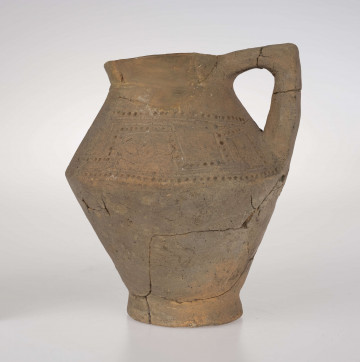
Vessel
National Museum in Lublin
Part of the collection: Archaeological monuments of the Lublin region
A richly decorated vessel with a smooth black surface, hand-made of clay, was found in the cemetery of the Przeworsk culture in Opoka, commune of Końskowola, the Puławy poviat, the Lublin Voivodeship. Archaeological research at the site was conducted in 1961-1962 by Zygmunt Ślusarski of the Regional Museum in Lublin.
The magnificent vessel, typologically described as a three-necked vase, served as an ashtray (urn) in one of the corpse graves in a bi-ritual cemetery located in the Kurówka River valley.
The vessel has a glossy black surface. The vase is clearly profiled, i.e. it has a sharply marked kink in the bowl and a distinct bottom. Above the kink there is an ornament in the form of herringbones, swastikas, formed by two engraved lines and a row of holes between them, as well as a blank ornament. These ornament-signs probably carried a magical content and reflected the cult of fertility, as well as the spheres of heaven and the cosmos. The ornamental motifs are located between three elbow-shaped bent ribbon ears.
The Vandals (representatives of the Przeworsk culture) often used richly decorated vessels, usually vases with a carefully finished outer surface, as ashtrays in cemeteries.
Local cultural variation is also reflected in the ceramics. This means that in certain regions of a given culture at a certain time there was a fashion for certain types of vessels and ornaments. The most interesting differences are presented by the vessels from the right-bank Mazowsze, Podlasie and Lublin regions. A characteristic feature of this area in the 1st and 2nd century AD is a multi-threaded ornament divided into three zones separated by lugs.
Author / creator
Dimensions
cały obiekt: height: 251 mm, diameter: 291 mm
Object type
dish
Technique
firing
Material
clay
Creation / finding place
Owner
The National Museum in Lublin
Identification number
Location / status